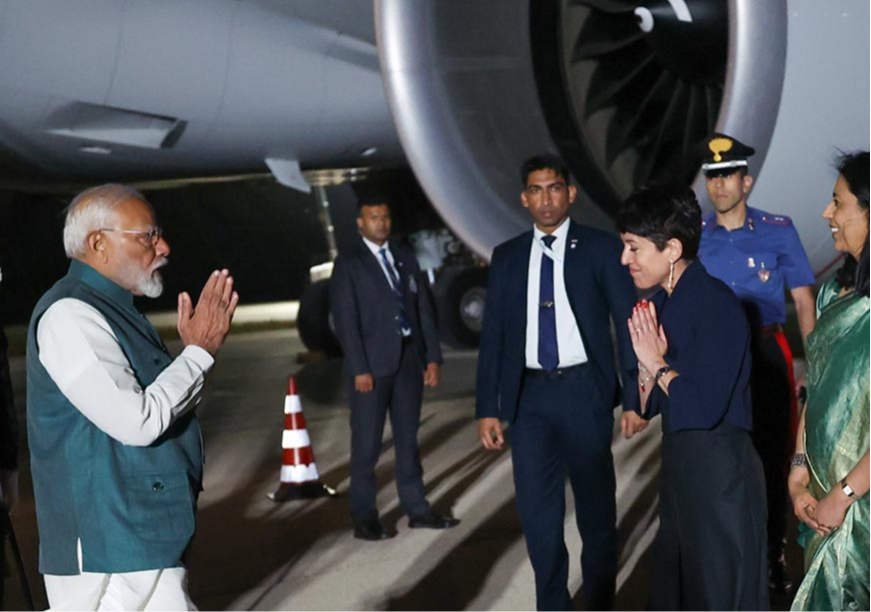At a time when a Russian nuclear submarine remains docked in Cuba merely 90 miles south of Florida, the G-7 leaders have gathered in Italy for the 50th annual summit of the grouping of one of the world's richest Western democracies. As the US-Russia tensions reach nearer to the American coast, Italy's Presidency of the G-7 has attempted to signal to the world that these geopolitical contestations cannot be reduced to a 'west versus rest' narrative.
The Symbolism Of Apulia
The Italians engaged in symbolism by hosting the summit in Apulia, a region in the southern part of Italy that is historically known to be a bridge between Eastern and Western cultures. The target audience for this signalling remains in the nations from the broader Global South, seen as non-Western states, as the G-7 shows that it is ready to deepen collaboration with developing states on matters of development, food security, energy security and climate change. To galvanise this West-Rest collaboration, Italy has invited 15 guest leaders, of which six are members of the G-20 and five are African nations.
The target audience for this signalling remains in the nations from the broader Global South, seen as non-Western states, as the G-7 shows that it is ready to deepen collaboration with developing states on matters of development, food security, energy security and climate change.
The African nations attending the G-7 remain fundamental to Italy's priority of solving the problem of energy supplies in Europe by connecting the energy transmission infrastructure of Europe and Africa through Italy.
The six guests from the G-20 include India, Argentina, Brazil, Saudi Arabia, South Africa and Turkey. Apart from Argentina, where there is a substantial population of Italian-origin expats, other G-20 invitees hold key strategic and security implications for the G-7. Turkey remains the only NATO member in the Middle East. Saudi Arabia holds a key stake in the Israel-Hamas conflict. India, Brazil and South Africa fall under the G-7's strategic calculus as they remain key representatives of the Global South and are either recent holders of the G-20 Presidency or are the next in line for it. Rather than only acting as a connecting interface between the G-7 and the G-20, these three nations hold a deeper significance for the G-7 as they remain the three democratic states that form the core BRICS grouping along the adversarial Russia and China.
Voice Of The Global South
India remains central to the G-7's calculus towards the Global South as seen from its regular presence at the group's summits as a guest since 2019. The G-7 is sensitive to the fact that it needs the global south giants like India on board, not only to increase the efficacy of their sanctions regime on Russia but to mechanise a global governance architecture that truly bridges the West with the
India's rising stature as a key player negotiating for the Global South while upholding the rules-based order makes it a natural ally of an evolved G-7 that places its policy weight towards being more egalitarian. Prime Minister Modi's visit to the Apulia Summit gains importance as India will continue to voice the concerns of the developing and emerging economies before the industrialised G-7. Though India's stance towards Russia will be dictated by its own strategic interests, PM Modi's choice of Apulia as his first foreign visit after a domestic re-election signals that India holds entrenched interests in its partnership with the G-7. In offering policy congruence towards the G-7, India complied with the Oil Price Cap on Russian oil while strategically balancing its domestic oil demand.
Prime Minister Modi's visit to the Apulia Summit gains importance as India will continue to voice the concerns of the developing and emerging economies before the industrialised G-7.
One key area of friction between the G-7 and India's interest came to the fore in the 12th round of sanctions against Russia, when the G-7 nations imposed an import ban on Russian-origin diamonds, hurting India's domestic diamond export industry that uses Russian diamonds as raw material. It is expected that the Indian presence at Apulia will be instrumental in arriving at a common understanding with the G-7, leading to a resolution of this issue.
As Apulia prioritises the global south, it remains to be seen whether the outcome of the summit is truly beneficial for the developing and emerging economies that remain high on Italy's agenda. There is a possibility of security issues maintaining primacy in agenda and action as the summit closely follows the decision of the US President and NATO members to allow Ukraine to use their weapons for undertaking limited military attacks on Russian territory. It is also the first meeting of the G-7 leaders after China encircled Taiwan in a show of strength directed towards the West and Taiwan's domestic political leadership demanding the island's recognition as a democracy. Another issue that is bound to play intra-G-7 is finalising the modalities of a $50 billion loan to Ukraine, secured by Russia's assets frozen by the US and Europe.
While the G-7 contests Russia and China, India at Apulia will participate as a partner democracy that holds commonality of values but is confident enough to look out for its own interests by lending a voice to its domestic population and that of the broader global south.
This commentary originally appeared in NDTV.
The views expressed above belong to the author(s). ORF research and analyses now available on Telegram! Click here to access our curated content — blogs, longforms and interviews.




 PREV
PREV


.png)
.png)